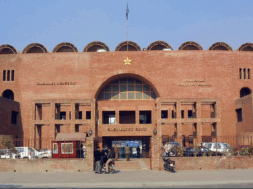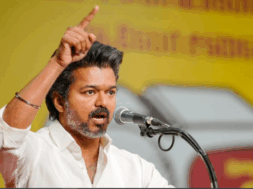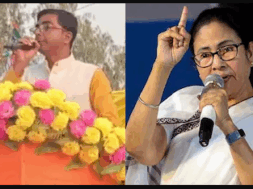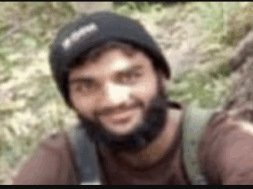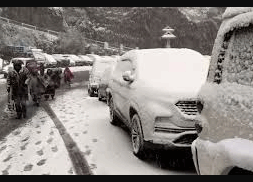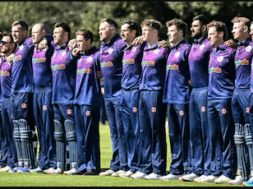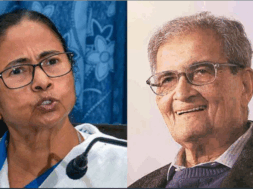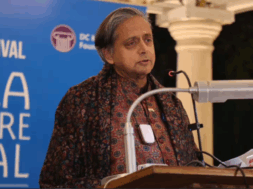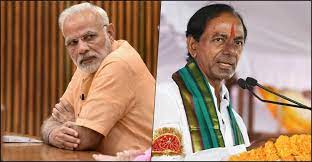
Manas Dasgupta
NEW DELHI, June 24: While the opposition unity move received a setback at its very first outing on Friday, the BJP-led NDA seems to be gaining more strength with the saffron party wooing several of its erstwhile alliance partners and the newly-formed Bharat Rashtra Samithi (BRS) launched by the Telangana chief minister KC Rao for the first time veering close to the BJP.
It took an intervention by West Bengal Chief Minister Mamata Banerjee and others to calm tempers when Congress and the Aam Aadmi Party, which went into the meeting with a pre-condition for a grand alliance, had a heated exchange over the Centre’s controversial Ordinance aimed at clipping the Delhi government’s hold over its own bureaucracy.
The intervening leaders questioned the Delhi chief minister Arvind Kejriwal on his insistence for the Congress to announce its stand against the Delhi ordinance at the Patna conclave itself even after the Congress had made it clear that decisions on the government bills are taken by the Parliamentary parties only on the eve of the Parliament sessions and there was no need to make the Delhi ordinance an exception. But even after the grand old party repeatedly stressed that the Patna conclave wasn’t the appropriate forum for that issue, the AAP threw a spanner in the opposition move announcing after the meeting that it would not participate in the future meetings unless the Congress agree that it would support the AAP to defeat the ordinance-replacing bill in the Rajya Sabha.
Kejriwal had told the meeting that his party was committed to not expanding to other states in the interest of larger opposition unity. Congress should announce their decision on Delhi Ordinance in the meeting itself, they, however, demanded.
Mallikarjun Kharge said Congress was open to aligning with like-minded parties, but also questioned AAP spokesperson’s alleged controversial statement just minutes before the meeting accusing the Congress of joining hands with the BJP for which it was not opposing the Delhi ordinance. “During Parliament session, Opposition parties regularly meet and chalk out a joint strategy. AAP has attended those meetings. Why should there be a different mechanism for this Ordinance? This cannot be a pre-condition for the alliance to fight BJP,” Kharge said.
Congress leader Rahul Gandhi said his party had an open mind about the alliance and was ready to forget the past. “We are here with an open mind…. without any past likes and dislikes. All of us will be flexible. We will need to be together in this fight, whatever it takes,” he said.
Though they later said seat-sharing discussions would be left to the next meeting in Shimla, the 32 leaders from 16 Opposition parties did touch upon the prickly issue in the four-hour long meeting but without any concrete formula.
Samajwadi Party’s Akhilesh Yadav, clarifying it wasn’t “anti-Congress”, said his party is from a big state, so “will have bigger heart.” “We are open for seat sharing or common candidate arrangement. We are not anti-Congress. The fight is against BJP,” he said.
Yadav’s party has maintained a calculated distance from Congress since their alliance for the 2017 UP state elections, in which the BJP won a landslide victory. The Samajwadi Party was believed to be bitter at its ally’s poor showing, despite extracting a considerable number of seats for itself in the alliance. Many believed Congress got more than it deserved. Akhilesh Yadav had even three months back categorically ruled out any kind of understanding with the Congress in Uttar Pradesh in the next Lok Sabha polls.
Mamata Banerjee argued that there should be only one joint Opposition candidate against the BJP. “This is a fight between people of India vs Modi,” she said.
Tamil Nadu Chief Minister and DMK chief MK Stalin said there must be different formula for different states. He suggested state-wise alliances under the leadership of a party that’s strong in the state. If there’s no alliance, either seat sharing arrangement or common candidate from the Opposition should be put up against the BJP, he said.
Congress, as the largest party, was asked to speak first, but party president Mallikarjun Kharge said they would speak the last after listening to all other leaders. Bihar Chief Minister and JD(U) chief Nitish Kumar spoke first, and termed the meeting the “first step” in a larger opposition unity. “More parties will join this coalition closer to 2024,” he said.
RJD chief Lalu Prasad Yadav said the biggest party in the state should lead, and other parties should extend support. “Bigger parties should show large heartedness. Congress should be open and flexible for seat sharing arrangements,” he said.
Nationalist Congress Party patriarch Sharad Pawar said the Opposition should work together to “protect democracy”, and not just for elections. Uddhav Thackeray called it a fight of dictatorship versus democracy.
PDP Chief Mehbooba Mufti, citing the abrogation of Article 370 and bifurcation of Jammu and Kashmir into a Union Territory, said what happened to Kashmir is not just limited to Kashmir, and the BJP will do it in other states too. Jharkhand Chief Minister and JMM Chief Hemant Soren said there should be joint campaigns across the country.
The next meeting will be held in Himachal Pradesh’s Shimla, and will be convened and headed by the Congress, it was decided. Mechanism for seat sharing arrangement between these parties will be discussed in the Shimla meeting, and more like-minded parties will be invited.
In contrast, the BRS signalling its increasing closeness to the BJP on Saturday ended its boycott of the centre-convened meetings and for the first time in two years attended the all-party meeting on Manipur convened by the union home minister Amit Shah.
The move comes as Telangana Chief Minister and BRS president K Chandrasekhar Rao, who was at the forefront of efforts to unite like-minded parties against the BJP, has given up on opposition unity and is now focused on presenting his ‘Telangana development model’. His party had also skipped the 16-party Patna conclave on Friday.
KCR, who had been relentless in his attacks on Prime Minister Narendra Modi – taking on the ‘Gujarat model’ and alleging that he chooses outfits based on elections – called the PM a “good friend” at a party event in Nagpur on June 15. And, while the mega opposition meeting was on yesterday, Mr Rao’s son and Telangana minister K T Rama Rao began a two-day visit to New Delhi, during which he met Defence Minister Rajnath Singh and is scheduled to meet Union Home Minister Amit Shah.
Mr Shah chaired the all-party meeting on the violence in Manipur, which began at 3 pm at the Parliament Library Building in New Delhi. KCR nominated senior leader and former Member of Parliament B Vinod to attend the meet, which is the first central meeting the BRS has participated in since November 2020.
The reported move by the sister of the Andhra Pradesh chief minister, who was emerging as the main challenger to KCR, to merge her party with the Congress is believed to have forced the Telangana chief minister to change his stand on the BJP.
Sources say the process has been further hastened by the name of KCR’s daughter, K Kavitha, cropping up in the Delhi liquor policy scam. She was questioned by the Enforcement Directorate twice and named in two charge-sheets. There were even reports of a possible arrest. But surprisingly her name was dropped in the third charge-sheet filed in April and the insiders said it was because the KCR had agreed to join hands with the BJP.
But while the BRS-BJP alliance could benefit the saffron party in the Parliamentary elections, the development was posing problems for the party for the Telangana state Assembly elections due later this year. The BJP’s perceived closeness with the BRS is learnt to be forcing some new entrants like Komatireddy Rajgopal Reddy and Eatala Rajender to move away to the Congress.
The sources said that if voters notice the BRS’s changing stand on the BJP, it may help the Congress in the assembly polls. The party, which is riding high on its victory in neighbouring Karnataka last month, may get anti-incumbency votes that may have otherwise gone to the BJP in a straight three-way contest. The BRS has been in power in Telangana since its formation in 2014.

